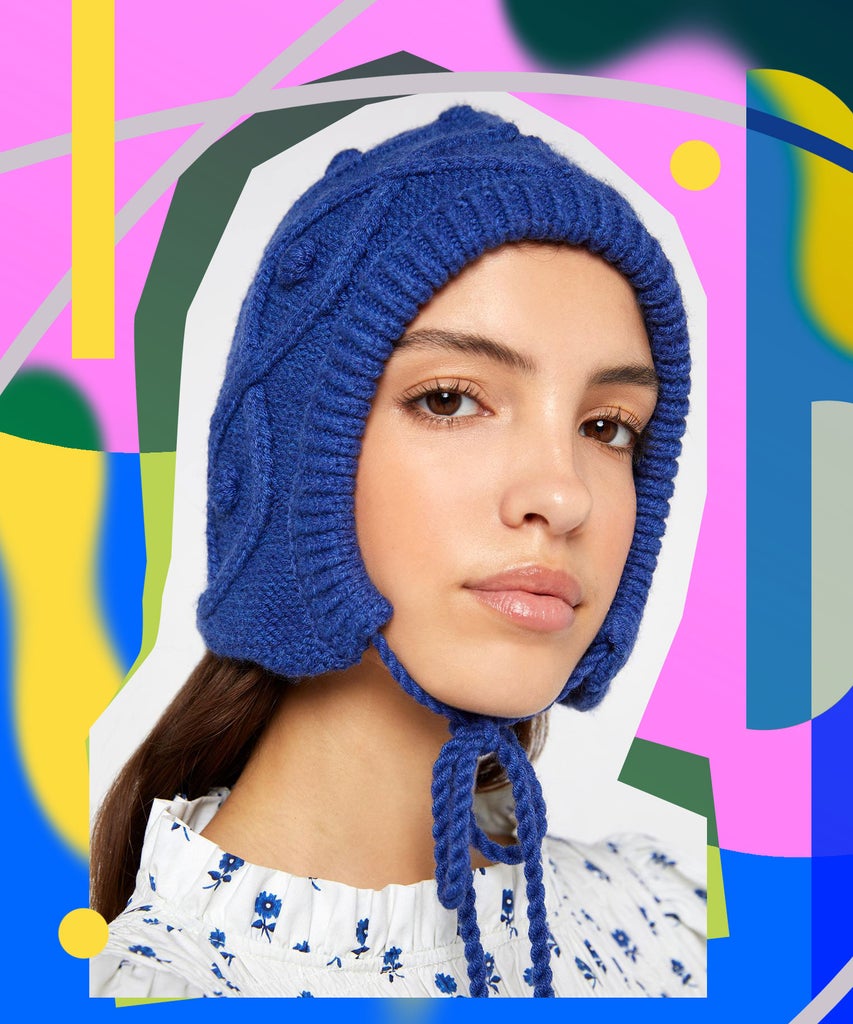
Flash-fashion events are like lightning, only lasting a hot second before disappearing into the seasonal ether — but even such fleeting fads can leave a lasting mark. Welcome to Micro Trends, where we explore the latest and greatest of these blink-and-you’ll-miss-them style moments.
It seems as though the winter beanie is taking a backseat this season. Instead, we’re seeing an influx for fuller head-coverage pieces like balaclavas, ski masks, and puffer hoods — but perhaps the next great hat alternative that ought to be on your radar is the bonnet. Yes, the kind of bonnet you’d usually see on babies but, you know, sized for adult heads.
“There have been a handful of bonnet revivals over the past century but two distinct bonnet approaches seem to be trendy right now: the close-fitting, monastic cap similar to those worn by Tudor women and the wide-brimmed ‘prairie’ bonnet, reminiscent of mid-19th century sun bonnets worn by women who spent much of their day working outside,” Sarah Jean Culbreth, fashion and textile historian, tells me. “The bonnet trend now might be a result of people watching period films and TV, or the popularity of antique and vintage sellers on Instagram, or maybe it’s a reaction to the cottagecore look that still pervades the fashion system.”
Skull Cap Bonnets
“Women have covered their heads with some version of a cap, or bonnet, for millennia,” says Culbreth, when I ask about the bonnet’s rich, centuries-spanning history. “One of my favorite early examples is a sprang net cap worn by women as early as the Bronze Age. Caps, usually of white linen, were worn every day by most 17th- and 18th-century women in Europe and the Americas and these are likely where the bonnets of today have their stylistic roots.”
Luxury Bonnets
While modern-day bonnets range in styles, materials, and fits, Culbreth tells me bonnets were typically constructed in two parts — a crown and a brim — which could be “simple or decorated to within an inch of their life with ruffles, lace, ribbon, pintucks, flowers, fur, and anything else fashion can conceive! In many ways, 19th-century fashion could be defined by the evolving shape and style of the bonnet, just as it could be charted by the changes in corset and petticoat silhouette.”
It’s no surprise that fashion brands are rolling out with more bonnet and hood styles this season, which could be seen as a younger cousin (and less intense) version of the full-head balaclava. DIY crocheters and Etsy makers alike are also seeing more of a demand for bonnets, which are arguably cuter and warmer than the beanie and easier to wear than, say, a ski mask.
Knit Bonnets
“Bonnets to me are a perfect beanie and balaclava hybrid,” Olivia Irja Strautmanis, an NYC-based crocheter, tells me. “I made my first bonnet four years ago when I had a short haircut and wanted something that covered my ears but was also flattering because most winter hats at the time made me appear bald.” Timing-wise, the rise of the bonnet also coincides with our second winter of the coronavirus pandemic. “A lot of makers used the pandemic as a time to hone in on skills and craft,” says Strautmanis. “We were looking for a way to make money when we all lost our day jobs in 2020. I think there was a surge in practical fashion during the pandemic in general and bonnets are a super practical winter accessory that can also make a statement.”
As a bonnet enthusiast (I myself own seven versions of the detachable winter hood, including one of Strautmanis’ designs), I can say I much prefer this type of cold-weather hat because I love how a bonnets cradles my head and plays nice with my hair — whereas wearing a beanie feels like I’m shoving my head into a sock. Plus, the ear coverage makes all the difference when trying to stay warm.
Rain Bonnets
“I like to wear caps and bonnets because they are practical and because I think they showcase your face in a sweet way,” says Culbreth, who is also a skilled needleworker and makes antique-inspired bonnets. “A brimmed bonnet with a skirt — when the fabric hangs below the crown — offers both face and neck protection from the sun. A wool cap that ties under the chin is warm and stays on when it’s windy. Bonnets are my interpretation of something like a baseball cap or a beanie — two accessories that, oddly enough, I will never feel comfortable wearing.”
At Refinery29, we’re here to help you navigate this overwhelming world of stuff. All of our market picks are independently selected and curated by the editorial team. If you buy something we link to on our site, Refinery29 may earn commission.
Like what you see? How about some more R29 goodness, right here?

No comments:
Post a Comment